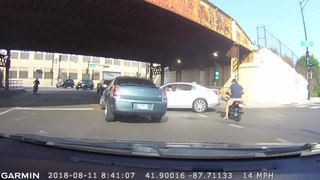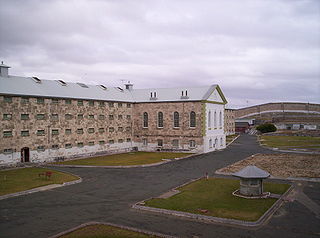Life imprisonment is any sentence of imprisonment for a crime under which the convicted criminal is to remain in prison for the rest of their natural life. Crimes that result in life imprisonment are considered extremely serious and usually violent. Examples of these crimes are murder, torture, terrorism, child abuse resulting in death, rape, espionage, treason, illegal drug trade, human trafficking, severe fraud and financial crimes, aggravated property damage, arson, hate crime, kidnapping, burglary, robbery, theft, piracy, aircraft hijacking, and genocide.
Sedition is overt conduct, such as speech or organization, that tends toward rebellion against the established order. Sedition often includes subversion of a constitution and incitement of discontent toward, or insurrection against, established authority. Sedition may include any commotion, though not aimed at direct and open violence against the laws. Seditious words in writing are seditious libel. A seditionist is one who engages in or promotes the interest of sedition.
Perverting the course of justice is an offence committed when a person prevents justice from being served on themselves or on another party. In England and Wales it is a common law offence, carrying a maximum sentence of life imprisonment. Statutory versions of the offence exist in Australia, Canada, Fiji, Ireland, and New Zealand. The Scottish equivalent is defeating the ends of justice, although charges of attempting to pervert the course of justice are also raised in Scotland, while the South African counterpart is defeating or obstructing the course of justice. A similar concept, obstruction of justice, exists in United States law.

The New South Wales Police Force is a law enforcement agency of the state of New South Wales, Australia, established in 1862. With more than 17,000 police officers, it is the largest police organisation in Australia, policing an area of 801,600 square kilometres with a population of more than 8.2 million people.
A hoon is an Australian and New Zealand term describing a person who deliberately drives a vehicle in a reckless or dangerous manner, generally in order to provoke a reaction from onlookers.

The criminal law of Australia is the body of law in Australia that relates to crime.
Causing death by dangerous driving is a statutory offence in England and Wales, Scotland and Northern Ireland, as well as Hong Kong. It is an aggravated form of dangerous driving. In the UK, it was created by section 1 of the Road Traffic Act 1988, and in Hong Kong it was created by section 36 of the Road Traffic Ordinance.
The Crimes Act1900 (NSW) is an Act of the Parliament of New South Wales that defines an extensive list of offences and sets out punishments for the majority of criminal offences in New South Wales (NSW), Australia. The Act, alongside the Crimes Act 1914 (Cth) and the Criminal Code Act 1995 (Cth), form the almost complete basis of criminal law for the State. It is the primary criminal law statute of NSW, and which formed the basis for the Australian Capital Territory's Crimes Act1900 (ACT).

Prostitution in Australia is governed by state and territory laws, which vary considerably, although none ban the selling of sex itself.
Allan Baker and Kevin Crump are a notorious Australian duo of rapists and double murderers who were sentenced to life imprisonment in 1974. Baker is serving his sentence at Clarence Correctional Centre whereas Crump died incarcerated at Wellington Correctional Centre in 2023.
The hate speech laws in Australia give redress to someone who is the victim of discrimination, vilification or injury on grounds that differ from one jurisdiction to another. All Australian jurisdictions give redress when a person is victimised on account of skin colour, ethnicity, national origin or race. Some jurisdictions also give redress when a person is victimised on account of religion, disability, gender identity, HIV/AIDS status or sexual orientation.

Lesbian, gay, bisexual, transgender and queer (LGBTQ) people in the Australian state of New South Wales have the same rights and responsibilities as heterosexual individuals and couples. LGBTQ rights in New South Wales enjoy bipartisan support.
Life imprisonment is the most severe criminal sentence available to the courts in Australia. Most cases attracting the sentence are murder. It is also imposed, albeit rarely, for sexual assault, manufacturing and trafficking commercial quantities of illicit drugs, and offences against the justice system and government security.

In traffic laws, a hit and run or a hit-and-run is the criminal act of causing a traffic collision and not stopping afterwards. It is considered a supplemental crime in most jurisdictions.

Punishment in Australia arises when an individual has been accused or convicted of breaking the law through the Australian criminal justice system. Australia uses prisons, as well as community corrections. When awaiting trial, prisoners may be kept in specialised remand centres or within other prisons.

The Bail Act 2013 is a New South Wales law that came into effect on 20 May 2014. It replaces the Bail Act 1978, which was considered "groundbreaking" when enacted, but has been reformed several times to presume against bail. The new act was created with the aims that it would be easier to understand, would further protect the community and would promote consistent decision-making. The Bail Act 2013 uses an "unacceptable risk" test in regard to whether "the accused will fail to appear in any proceedings for the offence, commit a serious offence, endanger the safety of victims, individuals or the community, or interfere with witnesses or evidence".
Brodie's Law is an amendment to the Victorian Crimes Act 1958 which makes serious bullying an offence punishable by a maximum penalty of 10 years' imprisonment. The law is named after Brodie Panlock, a 19-year-old who took her own life after being bullied at work. Brodie Panlock's parents, Damien and Rae Panlock, successfully lobbied the Victorian Government to make the amendment.
In the Australian legal system, a good behaviour bond is a type of non-custodial sentence which involves the condition of the offender's "good behaviour" for a set period. The condition of "good behaviour" primarily requires the offender to obey the law, but may also include additional probation officer supervision, mandatory medical treatment or participation in rehabilitation, counselling and intervention programs. These imposed conditions are determined by state legislation and at the magistrate's discretion. A good behaviour bond may be established with or without a recorded legal conviction for the offence. The specific conditions which constitute a good behaviour bond, as well as the consequences for breaching them, vary under each Australian state or territory's legislation, but overall are used most commonly for first-time and juvenile offenders.
The Roads and Crimes Legislation Amendment Act 2022 is an act of the Parliament of New South Wales which amended the Crimes Act 1900 and the Roads Act 1993 to create new criminal penalties for protest activities.







